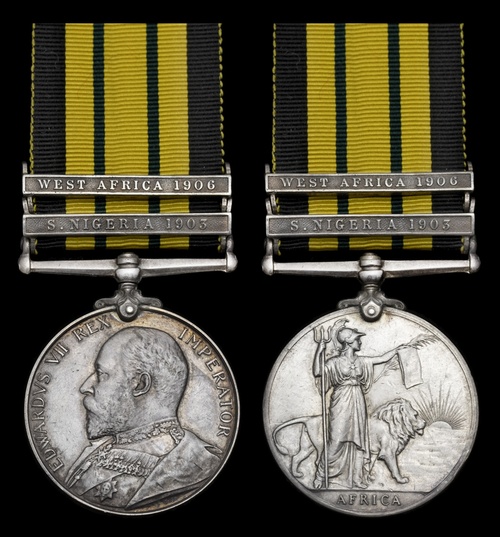
Auction: 24003 - Orders, Decorations and Medals
Lot: 69
'Every man from youth upwards carries a gun and knows how to use it. The gun is usually called a 'Dane' gun, antique it is true, but still a most effective weapon up to 40 yards, when charged with ugly metal slugs, with good powder well pressed down behind…When out for war, they augment their costume by the addition of a black skull cap.'
So states a Colonial Office report, following an uprising by the inhabitants of the Asaba Hinterland in Nigeria in the summer of 1906, which E. C. Crewe-Read joined after the murder of his brother, a fellow Distict Commissioner
The Africa General Service Medal awarded to Provisional Commissioner E. C. Crewe-Read, a long-served 'Africa hand', who served on a brace of punitive expeditions in Nigeria, the first after having come under attack from Ekets in his own District; the second after the brutal murder of his brother on the Asaba Hinterland Patrol, Crewe-Read then forged a long career in Kenya in the Political Administration
Africa General Service 1902-56, 2 clasps, S. Nigeria 1903, West Africa 1906 (E. C. Crewe-Read. S. N. Regt.), second clasp loose upon riband, good very fine
Edward Charles Crewe-Read was a well-travelled Colonial Administrator in East & West Africa. He was born at Llamndinam, Montgomeryshire on 15 June 1877 and was appointed to the Eket District in Southern Nigeria. He ran into trouble enforcing the Administrations road building policy. There was no hut tax in Southern Nigeria at this time, but the Africans were expected to build roads. While attempting to enforce this policy Crewe-Read was attacked by Ekets and by narrowly escaped with his life from the attacks.
Thus it was decided that Archibald Campbell Douglas (who penned Niger Memories under the nom-de-plume Nemo) would return as Administrator to join Brevet-Major A. N M. Mackenzie’s punitive patrol as Political Officer - to which Crewe-Read also served. The official dates in A.O.1/1906 are 16-25 September 1903, the trouble started at Okwa on 24 September, when Captain E. L. Roddy, leading the advance party was shot in the leg. Douglas recalled:
'Although severely wounded and suffering from loss of blood, he held his ground until relieved by Captain Hume, who then led the advance. The enemy firing with great determination on the Column subsequently killed two men and wounded nine others.'
Having come away with his life, Crewe-Read was married at Kensington in November 1905. He suffered family tragedy when his brother, Offley Stuart Crewe-Read, who was also a neighbouring Distict Commissioner in Nigeria, was murdered in June 1906. E. C. Crewe-Read went with the Political Department on the Asaba Hinterland Patrol to avenge his death. The opposition fought bravely and, by means of the effective deployment of their 'Dane' guns, inflicted over 130 casualties on the patrol's ranks. A. C. Chichester (Medal sold in these Rooms, April 2021 - £2,700 Hammer) was among them, being severely wounded near Agbor on 11 June 1906, following a remarkable march of some 40 miles, much of it under a heavy fire.
Captain W. C. E. Rudkin takes up the story in his Patrol Report:
'…The path, which had been very narrow up to this point, here debouched into the telegraph clearing, and we were attacked on three sides and forced to come to a halt. A Sergeant reported a large yam clearing on the left 30 yards away, on the outer side of a belt of bush, so I pushed a section through, the enemy resisting stoutly, and we had a hand-to-hand fight. Eventually the Hausas drove them into the open and charged magnificently, and this party fled, losing heavily.
After getting our wounded dressed and burying two men, we moved on again, and got along very slowly half a mile when the enemy's fire ceased. I then brought the scouts and flankers in from the bush and the advance guard rushed a hundred yards, which we made good without a casualty. The original style of fighting then went on for another hour, when we were again held up.
The position was extremely critical now, and we could not gain a yard for two hours. I had every available man, including some of the wounded in the bush, and herded the carriers, who lay flat under their loads, using them as shields. The carriers with light loads would now, I think, have willingly taken an extra weight so as to obtain something more substantial in the way of cover.
Twice the enemy drove in our left flank but we cleared them out. Chichester and Walmisley-Dresser were both badly hit, and most of us were hit with slugs which did not penetrate. Eventually they gave way and we advanced in a square formation, fighting literally for every yard. We had great difficulty in bringing on the wounded, who had to be carried in officers' chairs, on ponies, and on the backs of carriers, whose loads we threw away…'
Crewe-Read added a second clasp to his A.G.S. and no less than 5 D.C.M.'s were awarded for the events in 'West Africa 1906.
Crewe-Read was afterwards removed to East Africa and forged a long career in Kenya from January 1907, rising to be 1st Class Provincial Commissioner for the Rift Valley by 1929. He was District Commissioner at Eldama Ravine in 1909, Kajiado in 1911, at Naivasha in 1926 and at Nakuru in 1928. He was a member of the Rift Valley Sports Club and President of Nakuru Golf Club. Retired to England, he died at Folkestone in June 1939.
Subject to 20% VAT on Buyer’s Premium. For more information please view Terms and Conditions for Buyers.
Sold for
£1,000
Starting price
£1000




